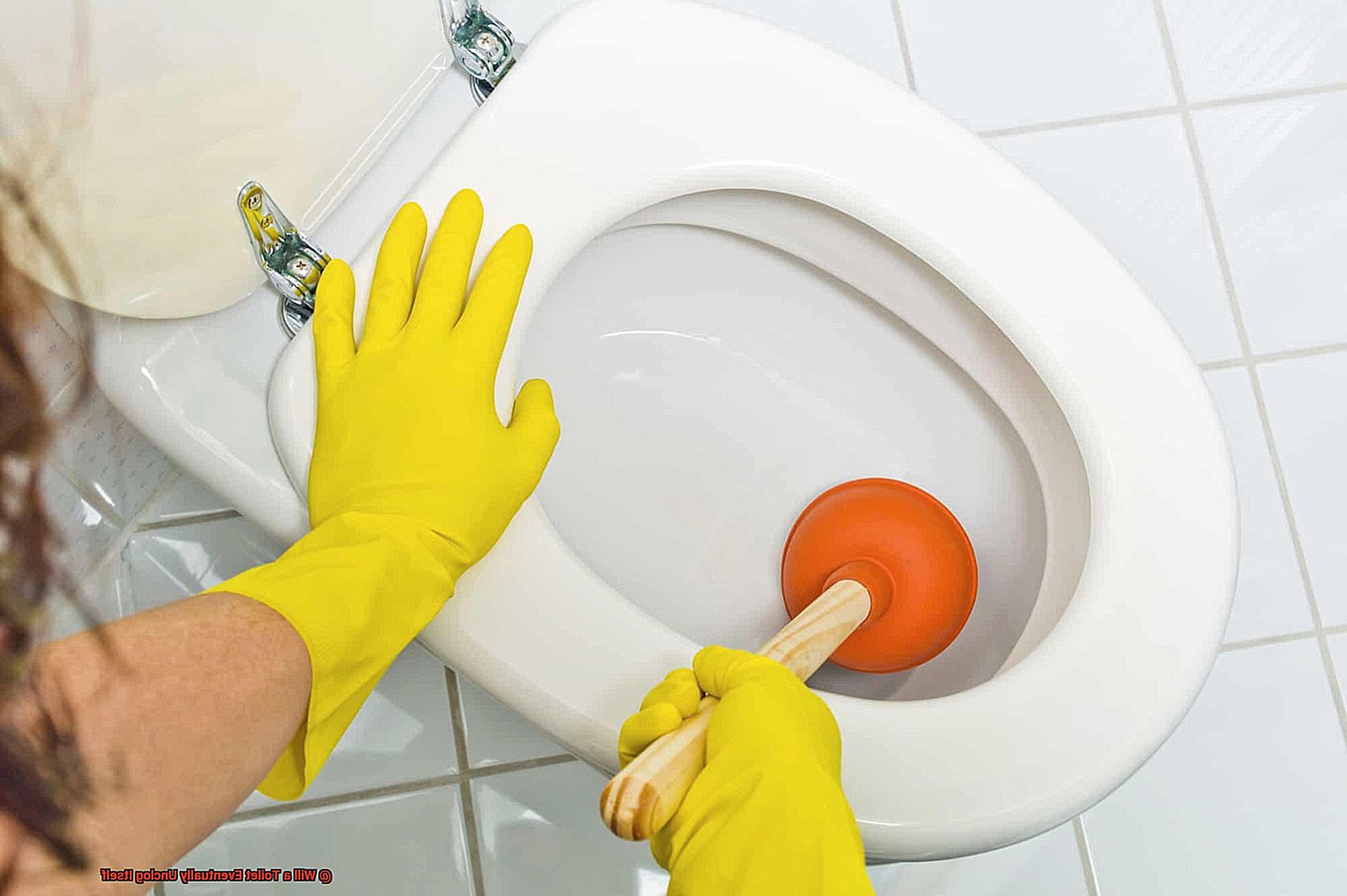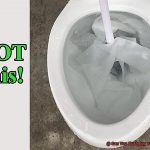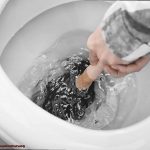Have you ever been in the middle of a relaxing bathroom break, only to be interrupted by a clogged toilet? It’s a nightmare that no one wants to deal with, especially if you’re having guests over. Your first instinct might be to wait it out, hoping that the problem will resolve itself. But here’s the million-dollar question – will a toilet eventually unclog itself?
Unfortunately, the odds are not in your favor. While small clogs may clear up on their own after sitting for a few hours or using a plunger to help it along, significant blockages require immediate attention.
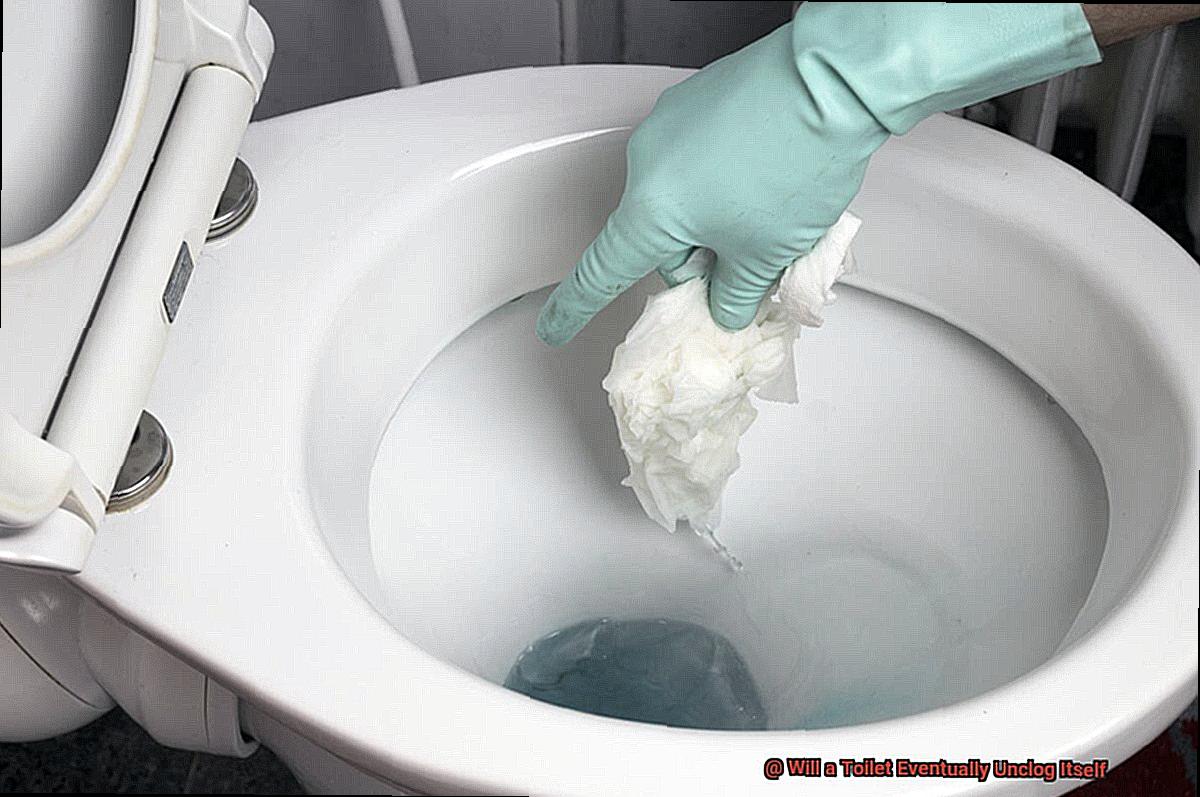
There are several reasons why your toilet could become clogged, including flushing inappropriate items down the drain, excess toilet paper usage, or even an underlying issue with your plumbing system. Ignoring the problem and hoping it goes away is not an option.
The longer you wait to address the issue, the more significant and problematic it becomes. A clogged toilet can lead to water damage and unpleasant odors throughout your home.
Thankfully, there are several solutions available to combat this pesky problem. Using a plunger or plumbing snake can often do the trick. However, if these methods fail, calling in a professional plumber is always an option.
In this blog post, we’ll explore why toilets rarely unclog themselves and provide tips on how to tackle this issue head-on. So sit tight (pun intended), and let’s dive into everything you need to know about handling clogged toilets.
Contents
What Causes a Toilet to Clog?
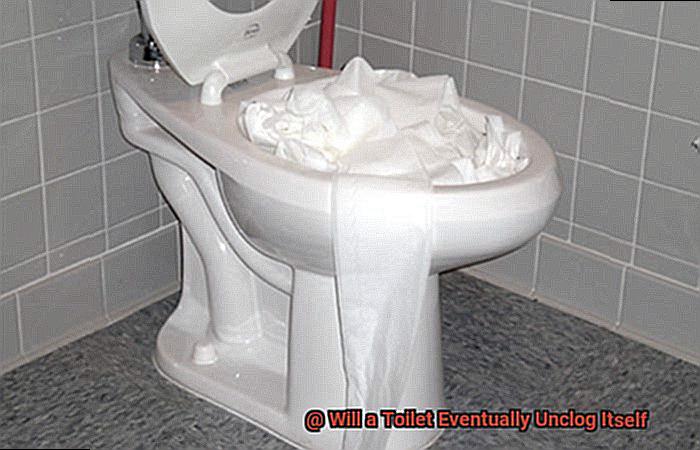
Toilets are a crucial part of our daily lives, but when they become clogged, they can turn into the ultimate nuisance. From unpleasant odors to potential water damage, a clogged toilet can cause major disruptions in our routine. So, what exactly causes a toilet to clog? Let’s take a closer look at the top five culprits.
The first and most common reason for toilet clogs is flushing non-flushable items down the toilet. Items such as paper towels, baby wipes, sanitary products, and dental floss should never be flushed down the toilet. These items do not break down easily and can cause blockages in the pipes over time.
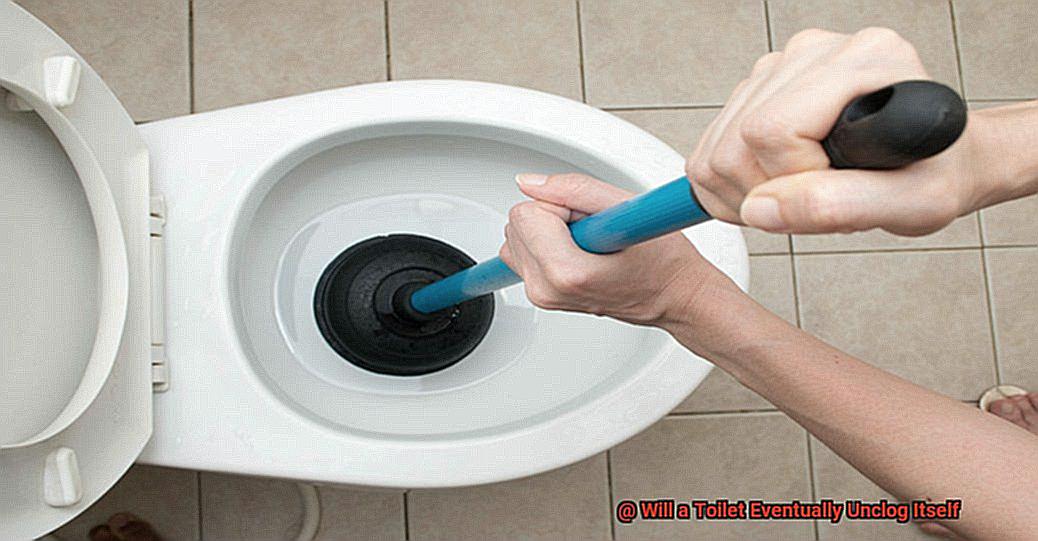
Another reason for clogged toilets is hard water buildup. Hard water contains mineral deposits that can accumulate in the pipes and toilet bowl, reducing their diameter and causing blockages. Installing a water softener can help prevent this buildup and keep your pipes clear.
Low flow toilets, designed to conserve water, are also prone to clogging due to their limited flushing power. It’s important to be mindful of what you’re flushing down the toilet if you have one of these toilets.
Old or faulty plumbing can lead to toilet clogs as well. As pipes age, they can corrode and develop cracks or leaks, which can trap debris and cause blockages in the pipes. Replacing old plumbing can prevent future clogs.
Finally, sewer line problems such as tree roots or debris buildup can cause blockages in the sewer line, resulting in clogged toilets. If you notice multiple drains backing up or detect sewage smells coming from your toilet, call a plumber immediately.
Can a Minor Clog Resolve Itself?
The answer is not as straightforward as one might think. Several factors come into play when determining whether a minor clog will clear up without intervention.
One crucial factor is the severity of the clog. Minor clogs caused by small debris or objects may dislodge and pass through the pipes naturally over time. However, more severe clogs caused by larger objects or material buildup may require professional intervention.
Your toilet system’s type also affects the likelihood of a minor clog’s self-resolution. Older toilets with weaker flushing power may struggle to push through even minor blockages, while newer high-pressure systems may be more effective at clearing blockages.
In addition to the toilet system’s type, the frequency of use can also impact whether or not a minor clog will resolve itself. If you use your toilet frequently, it is less likely that the clog will clear on its own. The constant buildup of waste material in the pipes can make it harder for the clog to dislodge.
It is possible for a minor clog to resolve itself without intervention, but this is not always guaranteed. To avoid further damage to your plumbing system, it is best to address any clogs promptly.
What If the Clog is More Severe?
Dealing with a clogged toilet can be a real pain, especially if it’s a severe one. But don’t worry. There are a few advanced techniques you can try to unclog the toilet and get things flowing again.
The first option is to use a plumbing snake, a long and flexible tool that can be inserted into the toilet drain to break apart and remove the clog. Just remember to use the snake with care to avoid damaging your plumbing system.
If the snake doesn’t work, don’t give up. You can try using a plunger with more force by plunging harder and longer to create enough pressure to dislodge the clog. Persistence is key.
But if neither of these methods work, it’s time to call in the professionals. Plumbers have specialized tools and knowledge to handle even the most stubborn clogs without causing any damage. Avoid using harsh chemicals or inserting foreign objects into the toilet, as they can cause further damage.
Prevention is always better than cure when it comes to avoiding severe clogs. Be sure to flush only waste and toilet paper down the toilet, and avoid flushing items such as feminine hygiene products, wipes or cotton balls.
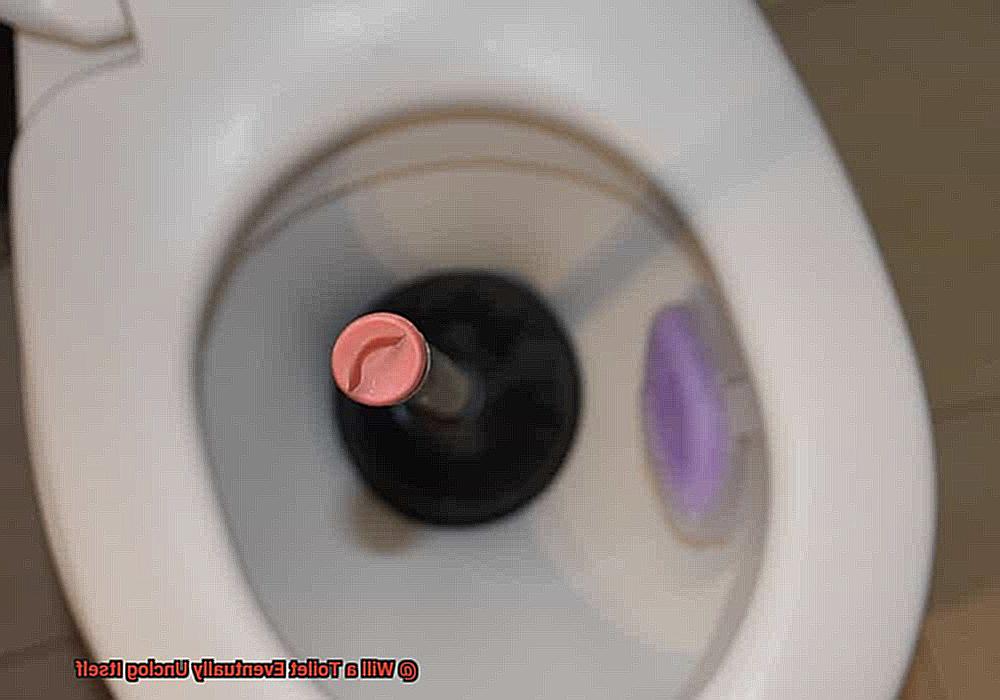
Regular maintenance, such as cleaning the toilet and checking for early signs of clogs, can also help prevent severe blockages.
Risks of Leaving a Clogged Toilet Unattended
Dealing with a clogged toilet is an unpleasant task, but ignoring it can lead to even bigger issues. Leaving a clogged toilet unattended can result in several risks that can impact both your home and your health. So, what exactly are the risks of leaving a clogged toilet unattended?
Firstly, a clogged toilet can cause wastewater to overflow onto your bathroom floor. This not only creates an unpleasant and unsanitary mess but can also cause water damage to your flooring and walls. In severe cases, the water damage may even spread to other areas of your home, leading to costly repairs. Don’t let a small problem turn into a big disaster.
In addition to causing water damage, a clogged toilet can also cause sewage backup. This happens when wastewater is unable to flow through your home’s plumbing system and instead backs up into your toilet and other drains. This poses a significant health risk as sewage contains harmful bacteria and viruses that can cause illness. So, it’s crucial to address the issue promptly to avoid any potential health hazards.
Furthermore, leaving a clogged toilet unattended can also lead to unpleasant odors in your bathroom. The longer the blockage remains, the stronger the odor will become. This can make it difficult to use your bathroom and create an uncomfortable living environment. Nobody wants that.
Overall, ignoring a clogged toilet is simply not worth the risks it poses. It’s important to address the issue promptly and seek professional help if needed to avoid any potential damage or health hazards.
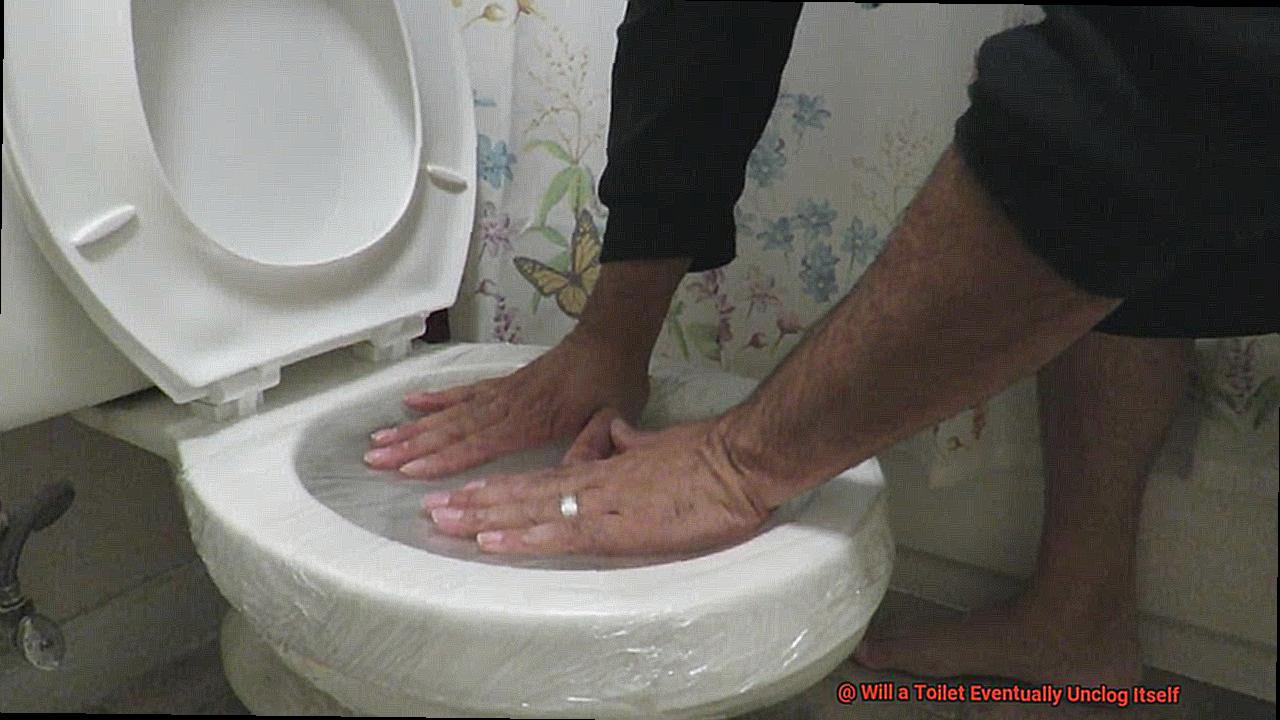
Remember, prevention is always better than cure, so take steps to prevent clogs from occurring in the first place by being mindful of what you flush down the toilet and using a plunger or plumbing snake at the first sign of trouble.
How to Unclog a Toilet Safely and Effectively
Don’t fret. Unclogging a toilet can be simple if you know the right methods to use. However, it’s essential to remember that if not done correctly, you can cause more damage to your toilet or even harm yourself. Here are five safe and effective ways to unclog your toilet.
Plunge it
If you’re wondering how to fix a clogged toilet, plunging is the most common method used. But, before plunging, ensure you have a sturdy plunger that can create a good seal around the drain opening. Use a slow and steady motion to plunge up and down several times, making sure to maintain the seal at all times. This should help dislodge the blockage and allow the toilet to flush correctly.
Use hot water and dish soap
Another effective technique for unclogging a toilet is by pouring hot water and dish soap into the bowl. The heat from the water can help break down the clog, while the soap lubricates the pipes. Let the mixture sit for several minutes before attempting to flush.
Use a plumbing snake
When plunging or hot water doesn’t work, using a plumbing snake can help clear stubborn clogs. Insert the snake into the drain and gently turn the handle to push it through the pipes. Once you feel resistance, continue turning until the snake breaks through the clog.
Baking Soda and Vinegar
Did you know that baking soda and vinegar can clear your clogged toilet? Pour baking soda into your toilet bowl followed by vinegar. The chemical reaction between these two ingredients will create an effervescent effect that should break down any clogs in your toilet.
Coca Cola
Surprisingly, Coca Cola can be used to unclog your toilet too. Pour one or two cans of Coca Cola into your toilet bowl and let it sit for at least an hour or overnight if possible. The acid in Coca Cola can break down stubborn clogs in your pipes.
It’s important to note that harmful chemicals such as drain cleaners should never be used as they can damage your pipes and cause harm to both humans and pets if ingested or inhaled. By using these safe and effective methods, you can unclog your toilet quickly and easily.
AhsR-lkkPiA” >
Conclusion
To sum it up, a clogged toilet is a headache that nobody wants to deal with. Although minor blockages might clear up on their own, significant obstructions demand immediate attention. Failing to address the issue can lead to more severe problems such as water damage and foul smells throughout your home. The top five offenders of toilet clogs include flushing non-flushable items, hard water buildup, low flow toilets, old or faulty plumbing, and sewer line issues.
If you’re seeking safe and effective ways to unclog your toilet, there are various methods available. These include plunging, using hot water and dish soap, utilizing a plumbing snake, baking soda and vinegar mixtures, or even Coca Cola. However, steer clear of harmful chemicals like drain cleaners as they could harm your pipes and pose risks to humans and pets.
Prevention is always better than cure when it comes to avoiding severe clogs. Only flush waste and toilet paper down the toilet while avoiding inappropriate items like feminine hygiene products or cotton balls.
Regular maintenance such as cleaning the toilet and watching out for early signs of clogs can also prevent severe blockages.

